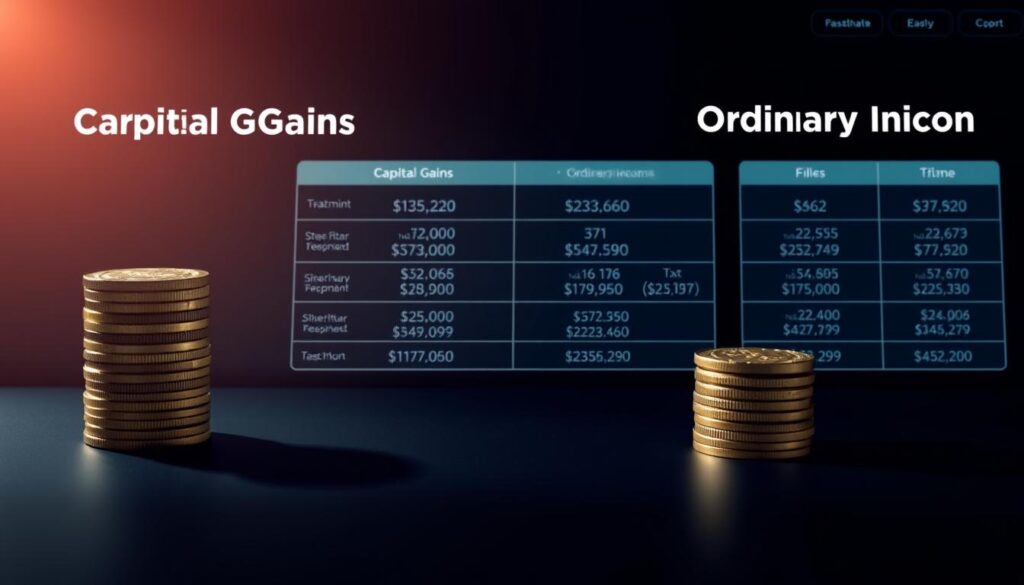The IRS views cryptocurrency as property. This means every transaction, like buying goods or swapping digital assets, has tax implications. Recent actions show the IRS is serious about making sure people follow the rules. They are cracking down hard on those who don’t report their crypto activities correctly.
Key Takeaways
- Every crypto transaction—including payments—has tax consequences tracked by the IRS.
- Digital asset taxation applies to profits from crypto purchases, sales, and exchanges.
- Failure to report crypto payments can lead to audits, fines, or legal action.
- Record-keeping is mandatory for all crypto transactions, including payments for goods/services.
- U.S. tax law requires reporting crypto gains even if transactions occur outside traditional banks.
Understanding the Basics of Cryptocurrency Taxation
In the U.S., tax rules for crypto are based on clear IRS definitions. Digital assets like Bitcoin or Ethereum are seen as property, not currency under cryptocurrency tax laws. This rule changes how gains or losses are reported. Since 2014, tax rules have changed to keep up with virtual currency taxes, showing how crypto is growing in finance.
Important terms help us understand these rules. A cost basis helps figure out profit when selling crypto. Fair market value shows what your crypto is worth at the time of a transaction. You must report taxes on sales, trades, or using crypto to buy things. The IRS also looks at actions like airdrops or hard forks, needing records of all transactions.
- Property vs. currency: Crypto’s IRS classification impacts capital gains rates.
- Reporting timelines: Taxes apply at the time of each transaction, not just sales.
- Documentation: Track every trade, including exchanges or gifts, to avoid penalties.
Not understanding these basics can lead to trouble. Knowing about virtual currency taxes helps follow changing rules. Whether you trade, mine, or spend crypto, knowing the basics is key to following the law.
The Tax Implications of Crypto Payments
Every time you use crypto for payments, you face tax rules. Whether you get paid in crypto or use it to buy things, the IRS wants you to report it. The tax implications of crypto payments depend on figuring out gains or losses at each step.
If you get paid in crypto, you must report its value at the time you got it. For instance, if you earn Bitcoin for work, you report its USD value on your taxes. Spending crypto also triggers taxes. Let’s say you sell crypto to buy lunch. The difference in value creates a gain or loss.
- Acquisition cost: The price you paid for the crypto.
- Fair market value (FMV): The USD value at the time of the transaction.
- Reporting requirement: All transactions must be tracked for Form 1040 reporting.
Crypto payment tax compliance requires keeping detailed records. You need to track each transaction’s date, type, and values. Not doing so can lead to penalties. While tax software can help, it’s not a substitute for accurate records.
Even small crypto transactions, like buying coffee, must be reported. Forgetting to report a $50 crypto coffee purchase can make your taxes more complicated. The IRS views all crypto activities as taxable, so every transaction affects your taxes.
Capital Gains vs. Ordinary Income: How Crypto Payments Are Categorized
Every crypto transaction is classified as either capital gains or ordinary income under IRS crypto regulations. This classification affects how taxes are figured out and reported. It’s important to categorize correctly to follow digital asset taxation rules and avoid fines.

Capital gains happen when you sell or trade crypto. The length of time you hold it decides if it’s short- or long-term:
- Short-term gains: Assets held
- Long-term gains: Assets held ≥1 year qualify for lower capital gains rates.
Some crypto activities are considered ordinary income. For instance, mining rewards or getting crypto as payment for work are taxed like wages. The IRS taxes these as income in the year you get them.
Keeping records is key. Make sure to document:
- Transaction dates and values
- Proof of ownership transfers
- Proof of income (e.g., mining logs)
Not tracking these details can lead to wrong reporting under IRS rules. Check outofficial IRS crypto tax resources for more information.
How Receiving Cryptocurrency as Payment Affects Your Tax Liability
Getting cryptocurrency as payment means you have to pay taxes right away. The IRS sees crypto as property. So, you must report its fair market value (FMV) in US dollars when you get it as taxable income. This rule applies to freelancers, business owners, and gig workers who get crypto for their work.
Crypto prices can change a lot, making it hard to figure out its value. If you get crypto when Bitcoin is $30,000, that’s your income, even if prices go down later. Blockchain tax guidelines say to use reliable places like Coinbase or CoinMarketCap to find this value. Not tracking this well can lead to not reporting enough income.
- Income tax applies to the FMV on the day of receipt
- Self-employment taxes (15.3%) may apply to crypto income for independent contractors
- Double taxation risks exist if you later sell or spend the crypto at a higher value
If you often get crypto, you need to keep track of it well. Use spreadsheets or tools like CoinTracker or ZenLedger to record every transaction. This helps show you followed IRS rules on Form 1040 Schedule C or 1099-MISC. Not doing this could cause audits or fines.
Following blockchain tax guidelines also means figuring out the tax basis when using crypto to pay for things. Look at IRS Publication 544 for how to do this. Knowing this helps you pay the right amount of taxes and stay legal.
Tax Consequences of Using Cryptocurrency to Pay for Goods and Services
Every time you use cryptocurrency to buy something, you have to track it for taxes. The tax implications of crypto payments mean you need to figure out if you made a profit or loss. If you don’t keep good records, you might end up paying more taxes than you should.
The “Spend and Replace” Strategy
Many people sell their crypto to buy something, then buy the same amount back. This way, they don’t have to worry about the cost. But, they need to keep accurate records. If they make mistakes, the IRS might come after them.
Calculating Your Tax Basis in Spent Cryptocurrency
There are three ways to figure out your tax gains:
- FIFO means using the oldest coins first, which can lower your taxes if you’ve held them for a long time.
- LIFO uses the newest coins, which is better if prices have dropped.
- Specific ID lets you choose which coins to tax, helping you save money but requiring detailed records.
Special Considerations for Business Expenses
Businesses that use crypto for expenses need to track each transaction’s cost. They must have proof of business use, like invoices or ledgers. IRS Form 8949 requires detailed records for all crypto payments, even for small buys.
Mining, Staking, and Other Crypto-Earning Activities: Tax Considerations
Cryptocurrency tax laws cover all earnings from crypto activities, like mining and staking. Mining cryptocurrency is seen as ordinary income by the IRS. This income is valued at its fair market value on the day you get it.
For instance, if you mine Bitcoin worth $30,000, you must report it as income. Staking rewards and DeFi interest are taxed the same way. They are considered taxable income when you receive them.
- Mining: Report the full value of mined coins on your tax return.
- Staking: Rewards are taxable income when distributed or credited to your account.
- DeFi and liquidity: Earnings from yield farming or providing liquidity qualify as taxable events.
Business expenses for these activities can be deducted. Miners can deduct costs like hardware, electricity, and software if they run a business. The IRS requires crypto income reporting for all gains, even if held long-term.
Not reporting staking rewards or mining proceeds can lead to audits or penalties. It’s important to follow tax laws.
Keep detailed records of every transaction, including dates, values, and expenses. Use crypto tax software to track income from different activities. It’s wise to consult a tax professional to make sure you’re following the latestcryptocurrency tax laws. This helps avoid underreporting and legal issues.
Record-Keeping Requirements for Cryptocurrency Transactions
Keeping accurate records is key for crypto tax compliance. The IRS needs detailed records to check if reported transactions match blockchain tax rules. Without the right records, audits could lead to penalties or disputes.
Essential Documentation to Maintain
- Date and time of each transaction
- Type (buy, sell, transfer, or trade)
- Amount and USD value at transaction time
- Exchange or wallet addresses involved
- Purpose (personal use, business expense, or investment)
Recommended Crypto Tax Tracking Software
Automated tools make tracking easier. Some top choices are:
- CoinTracking: Tracks over 200+ exchanges and chains
- CryptoTaxCalculator: Integrates with IRS forms
- Koinly: Highlights wash sale rules for taxable accounts
These tools automatically download trade data, calculate cost basis, and create reports for tax filings.
How Long to Keep Records
IRS rules say to keep records until the tax return’s statute of limitations ends. For most, keep records for at least three years after filing. Long-term assets need records until tax reporting. Business crypto transactions might need permanent records.
IRS Reporting Forms for Cryptocurrency Transactions
IRS crypto rules need you to report virtual currency taxes on specific forms. All U.S. taxpayers must answer the “Did you sell, exchange, or otherwise receive virtual currency?” question on Form 1040. Depending on your activity, you might need more forms.
- Form 8949/Schedule D: You need this for crypto capital gains/losses from trading
- Schedule C: You must use this for business income from mining/staking
- Schedule 1 (Form 1040): This form is for airdrops, forks, or other non-trading income
- Form 8938: You need this if you have crypto worth over $100K and file separately
- FBAR (FinCEN Form 114): You must file this if you have crypto on foreign exchanges over $10K
Deadlines are the same as tax filings, but you can get an extension with Form 4868. Not reporting correctly can lead to penalties up to 50% of what you owe. Even if it’s a mistake, you could still face penalties.
Businesses using crypto for payments must report on Schedule C by April 15 every year. If you have foreign holdings, you must follow both IRS crypto rules and international reporting. Always check the Form instructions each year as IRS rules change.
The Consequences of Non-Compliance with Crypto Tax Laws
Ignoring cryptocurrency tax laws can lead to big financial and legal problems. The IRS takes digital asset tax violations very seriously. Penalties can get worse based on how serious the mistake is.

Not reporting crypto transactions can cost you 20% of unpaid taxes. If you’re late, you’ll face a 5% penalty each month. Plus, you’ll owe daily interest on what you owe.
Willfully hiding taxes can even get you in jail. You could face fines up to $250,000 or time behind bars.
The IRS uses John Doe summonses to get information from exchanges and track blockchain. They’re also using Operation Hidden Treasure to find unreported crypto gains. They have advanced tools to find these violations.
If you missed reporting, there’s a way to fix it. The IRS Voluntary Disclosure Practice lets you pay what you owe and penalties. You can also file amended returns or quiet disclosures to avoid criminal charges.
State-Level Tax Considerations for Crypto Payments
Federal crypto tax rules apply everywhere, but state taxes add more complexity. Each state has its own way of handling tax implications of crypto payments. This affects how people and businesses follow crypto payment tax compliance. The main differences are in income, sales, and estate taxes.
Wyoming and Nevada are good places for crypto users. Wyoming doesn’t tax crypto and lets you use digital wallets without hassle. Nevada doesn’t tax income, making it easier to report crypto earnings. But, New York and California have strict rules. California taxes crypto gains, and New York requires businesses to get a BitLicense.
- Sales tax: Some states, like Florida, say buying crypto is like buying something and must be taxed.
- Estate taxes: Places like Pennsylvania and Washington tax crypto you inherit as part of your estate. You have to value it at the time of death.
- Reporting: More than 20 states now ask for crypto-related info on tax forms.
It’s important for residents to know their state’s crypto tax rules. Not following these rules can lead to penalties, even if you’re good with federal taxes. Always check local rules or talk to a tax advisor to make sure you’re following all the rules.
International Tax Implications for US Crypto Users
US taxpayers using crypto internationally must follow strict IRS rules. They need to report crypto income from foreign exchanges and cross-border trades. Not following rules like FBAR or FATCA can result in penalties.
FBAR and FATCA Reporting Requirements
Certain transactions require mandatory disclosures. The FBAR asks you to report foreign crypto accounts if they’re worth over $10,000. FATCA requires Form 8938 for certain foreign assets. Key rules:
- Report foreign crypto holdings over thresholds on FinCEN Form 114 (FBAR).
- File Form 8938 with tax returns for foreign crypto assets above $50,000 (single filers).
Tax Treaties and Foreign Crypto Exchange Usage
Tax treaties between the US and other nations can make things easier. For example, foreign tax credits can reduce double taxation on crypto gains. Strategic planning helps follow both local and US rules. Platforms like Binance or Kraken in treaty countries might make reporting easier.
Avoiding Double Taxation
IRS rules help claim foreign tax credits on crypto income. This way, you don’t pay taxes twice on the same transaction. It’s wise to get help from experts to deal with complex rules and unclear residency on decentralized platforms.
Tax Planning Strategies for Cryptocurrency Investors and Users
Being proactive is crucial for lowering virtual currency taxes and following blockchain tax guidelines. By timing when you sell assets and managing your portfolio, you can cut down on taxes a lot.

- Tax-loss harvesting: Sell assets that have lost value before the year ends. This way, you can offset gains and avoid certain tax rules.
- Long-term holding: Keep assets for more than a year. This makes you eligible for lower capital gains rates.
- Entity structuring: Think about using LLCs or S-Corps for traders. It helps keep personal and business crypto separate.
- Charitable donations: Give appreciated crypto to charities. This way, you can avoid capital gains taxes and use donor-advised funds.
- Life event planning: Match crypto distributions with big life events like retirement or education. This can help you save on taxes.
It’s important to check blockchain tax guidelines every year. This keeps you up to date with changing laws. Talk to tax experts who know about virtual currency taxes to make plans that fit your financial goals. Knowing about new rules helps you avoid fines and save more money.
How Tax Professionals Can Help Navigate Crypto Taxation
Understanding crypto taxes needs knowledge of cryptocurrency tax laws. Experts help follow IRS rules, especially for tricky deals like staking or NFT sales. A good advisor makes crypto payment tax compliance easier and lowers risks.
What to Look for in a Crypto-Savvy Tax Advisor
- Certifications such as CPA with crypto specialization
- Experience with platforms like Coinbase and DeFi protocols
- Familiarity with IRS Form 1040 schedules and crypto-specific software
Questions to Ask Before Hiring
- How do you handle crypto payment tax compliance for NFTs or yield farming?
- Are you trained in the latest IRS cryptocurrency tax laws?
- Can you explain how you calculate taxable events for decentralized exchanges?
When DIY vs. Professional Help Makes Sense
Try DIY for easy transactions on platforms that give Form 1099-B. But, you need a pro for:
- High-frequency trading or international crypto transfers
- Yearly crypto income over $100k
- Staking, lending, or DeFi participation
Professional fees might seem high, but they can save you from bigger penalties. Think about your portfolio’s complexity before deciding.
Common Myths and Misconceptions About Cryptocurrency Taxation
Many people don’t understand digital asset taxation well. This leads to risks of not following the rules. Here are some myths to steer clear of:
- Crypto is anonymous and untraceable: The blockchain’s transparency lets tax authorities track transactions via blockchain tax guidelines.
- Crypto-to-crypto swaps aren’t taxable: Swapping one coin for another is taxable. It’s based on the fair market value at the time.
- Small crypto trades don’t matter: All transactions, big or small, must be reported under IRS rules.
- Spending crypto isn’t taxable: Using crypto to buy goods/services is taxable. It’s based on the asset’s value when spent.
- Transferring crypto between wallets creates a tax issue: Moving crypto between personal accounts doesn’t count as a taxable event.
- All crypto activities are hobbies: Business-related crypto activities need proper documentation. This avoids misclassification.
Ignoring these truths can lead to penalties. Stay up to date with IRS blockchain tax guidelines and track all transactions. Keeping accurate records helps avoid common mistakes in digital asset taxation.
Staying Compliant in an Evolving Regulatory Landscape
Crypto tax rules change as IRS crypto regulations grow. Keep up with updates through official IRS publications and tax court decisions. Subscriptions to IRS.gov and crypto tax software alerts help you stay informed.
Changes might affect when you report crypto income or how you classify transactions. Adapt your strategies by reviewing your crypto holdings with a tax advisor every year. Use tools like CoinTracker or ZenLedger to track your trades and update your records.
Keep your records flexible in spreadsheets or cloud-based systems for easy updates. Follow legislative updates through Congressional hearings or IRS guidance on cross-border transactions and new asset types.
Penalties for not following the rules are getting higher as enforcement gets stricter. Review Form 1040 Schedule 1 and Form 8918 requirements every year. Work with CPA firms that specialize in digital assets to understand complex rulings.
Even as laws change, the core rules stay the same: report all crypto gains, losses, and exchanges accurately. Being proactive in adapting to changes ensures you stay compliant in this ever-changing space.
FAQ
What are the tax implications of receiving cryptocurrency as payment?
Getting cryptocurrency as payment means you have to report it as income. You must value it at its market price when you get it. This could also mean you have to pay self-employment taxes if it’s for your business.
How should I report crypto transactions on my taxes?
You’ll need to use IRS Form 1040 for all crypto transactions. You might also need Schedule D and Form 8949 for gains or losses. If it’s for your business, you’ll use Schedule C. Keeping detailed records is key for tax compliance.
Are crypto-to-crypto transactions taxable?
Yes, swapping one crypto for another is taxable. It can result in a capital gain or loss, just like selling a stock.
What record-keeping is necessary for cryptocurrency transactions?
You need to keep detailed records of each transaction. This includes the date, amount, USD value, parties involved, and the transaction’s purpose. Using crypto tax software can help with this.
What happens if I fail to report my cryptocurrency transactions?
Not reporting can lead to penalties and interest. In serious cases, the IRS might even pursue criminal charges.
Are there special considerations for mining and staking cryptocurrencies?
Mining and staking generate income equal to the crypto’s market value at receipt. Any later sales would be taxed as capital gains.
How do tax laws treat cryptocurrencies at the state level?
Most states follow federal law, treating crypto as property. But, some states have their own rules, like different sales taxes on crypto.
What international tax obligations should US citizens with crypto engage with?
US citizens must report crypto on foreign exchanges if it’s over ,000. Tax treaties can also affect international crypto taxes.
What are common misconceptions about cryptocurrency taxation?
Some think crypto transactions are anonymous or tax-free if small. But, the IRS can track transactions, and all are taxed, no matter the size.
How can I stay compliant with evolving cryptocurrency tax regulations?
Keep up with IRS updates and new laws by following tax experts and crypto news. Regularly update your knowledge to stay compliant in this changing field.


No comments yet